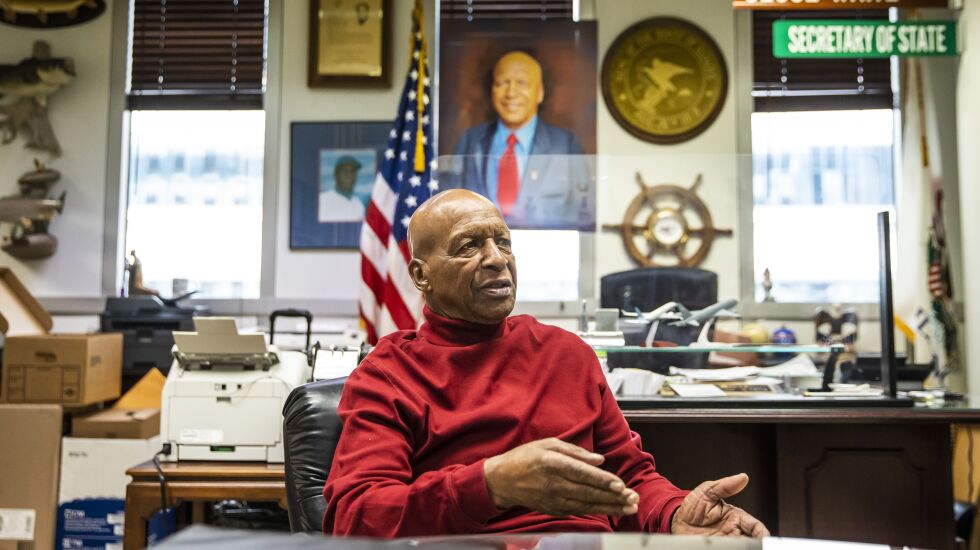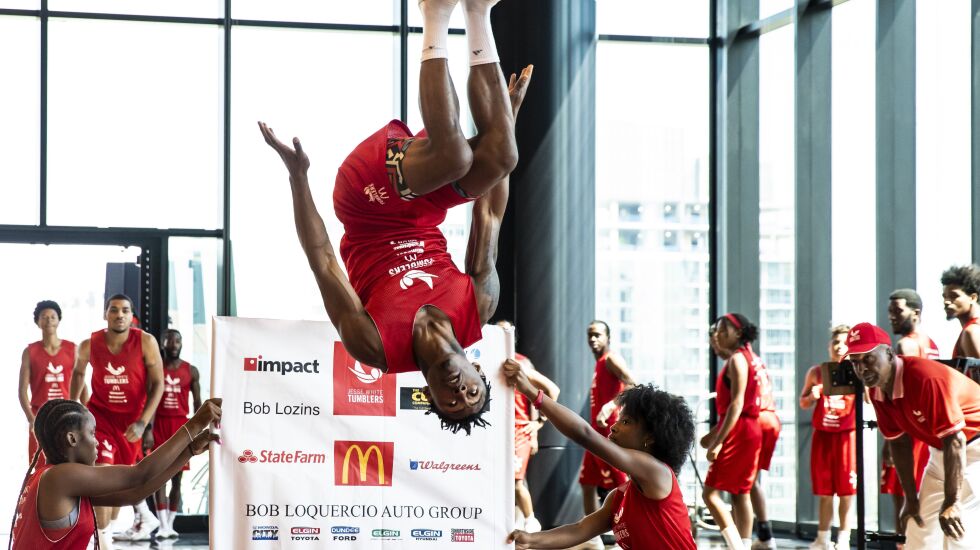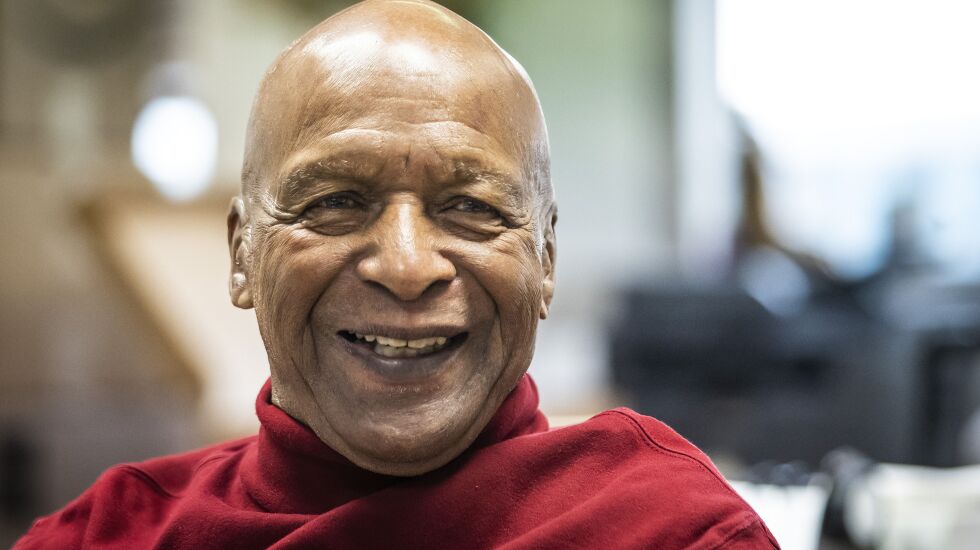
Jesse White argued with Dr. Martin Luther King Jr., trying to push back against this nonviolence nonsense.
In 1955, when King came to lead the bus boycott in Montgomery, Alabama, White was a junior at Alabama State.
“He wrapped his arms around me, I was special to him,” said White, Illinois secretary of state since 1999. He’ll be replaced by Alexi Giannoulias in January.
Why was White special to Dr. King? Because White was such a good basketball player, the man who, it is said, brought the jump shot to the Southland when players still shot underhand.
King was not beyond showing his favor in direct, tangible form.
“After every basketball game he’d give me $20,” remembered White. “I was on public aid here in Chicago. Came from a family of seven; that was big money then. It was legal then, not legal now.”
That was at Thursday night services, the same ones where King told the students dragooned to fill up the room about Rosa Parks.
“ ‘I’ve been asked by the city fathers to desegregate the transit system and have agreed to do so,’ ” King said, in White’s recollection. “ ‘I’m going to use the nonviolent means approach.’”
The tactics of Gandhi did not sit well with young White.
“I raised my hand. He said, ‘Jesse White, what can I do for you?’” said White, with impressive specificity after 67 years. “I said, ‘Dr. King, you know me, you know me well. I’m from Chicago, and we don’t operate like that.’”
That’s a good story, and to sit in White’s memento-, award- and photo-lined office in the Thompson Center, itself about to pass from government service, is to be plunged into a series of complicated tales about dramatic moments in his life — playing baseball for the Cubs organization, his 35 parachute jumps with the 101st Airborne Division — two realities that were interconnected. Fresh out of college, he was drafted four days before he was to start playing with the Cubs.
“It killed me,” he said. “I did all I could to keep from going. Finally, I went.”
After his two years in the Army, White would play minor league ball for seven years, a time in his life that is still very present with him. He hands a visitor a sheet of his minor league statistics in places like Carlsbad and Wenatchee and San Antonio. His lifetime average was .291.

By now you might be wondering: “Wait a minute! What about the Jesse White Tumblers? What about processing driver’s licenses?”
It is true the Tumblers, teams of fit young Black boys and girls starting at age 6, have been a fixture at parades and halftimes, around the city and around the world, since White founded the group in 1959 at a Chicago Park District field house where he worked in the summer, near the Rockwell Gardens public housing project. It was supposed to be for a one-time show.
But the Tumblers are the one thing about Jesse White that everyone in Chicago knows, or should know. To talk too much about them is to risk informing you about the ivy on the outfield wall at Wrigley Field or about the Willis Tower, which used to be known as the Sears Tower. It’s very tall. As with baseball, the Tumblers stats are a point of pride with White.
“I’ve had over 18,500 kids, and at last count, at my knowledge, only 15 have gotten themselves in trouble with the law,” he said.
A ratio of less than one troublemaker in a thousand is a dynamic the city would love to replicate; what’s his secret sauce?
“The reason for that is I taught school for 33 years, and I also served in the military, and I’m a hard-nosed guy,” said White. “I’m honest, I’m hard. I have a big heart. And the kids know that.”
Why did he want to take on all that responsibility? For the first few years, he didn’t.
“Every year I said I was going to quit, that this was going to be my last year. And then the kids would come to me with tears in their eyes and say, ‘Mr. White, please don’t give up the team,’ ” he tells Rick Davis in his biography, “They Call Heroes Mister: The Jesse White Story.” “And the parents would come by and tell me that if they didn’t have this program, their kids would be on the streets and end up being prey for the gangs.”
Then there is the secretary of state’s office. He was noted for making the department more efficient, for programs to promote organ donation and combat drunk driving. If his near quarter century there has been notably free of scandal, remember who his predecessor was.
“George Ryan was the previous office holder,” White said. “They were selling driver’s licenses, state IDs. Requiring the employees to buy fundraising tickets, sell fundraising tickets and attend political events. I thought that was ugly.”
He said he wanted no part of corruption.
“I learned a long time ago not to yield to temptation,” he said. “I believe in honesty, fairness, duty.”
Not that his term was without moments of drama. When prison-bound Gov. Rod Blagojevich used his last days in power to appoint Roland Burris to the Senate seat vacated by Barack Obama, White refused to sign the paperwork.
“Easy call,” White said. “It could be my mother, brother, aunt, uncle, father. I wouldn’t sign that document.”
Why retire now?
“I spent 16 years as a state lawmaker, six as the Cook County recorder of deeds, 24 years running the largest secretary of state office in the nation, eight years of professional baseball. Military. Teacher,” said White, who’s 88.
“As they would say in my neighborhood, it was time for me to ‘Take a TZ.’ But I’m going to still be actively involved with the Tumblers because, as I’ve said before, I’ve had 18,500 kids and only 15 have gotten into trouble. Every year we give 20 of those kids a scholarship ...”
He loves to fish; he said he still skis and exercises regularly.
‘You have to force yourself,” he said. “The older you get, the more you have to work at it.
He was divorced about 20 years ago. He does date.
“Oh certainly,” he said. “I’m a brother-man. ... I’m solo. I’m enjoying life.”
White is among a dwindling number of old-school Democratic Machine stalwarts, who came up ringing doorbells for former Cook County Board President George Dunne out of the 42nd Ward Democratic headquarters.
Asked to name his favorite politician to work with, he immediately points to the photo of Dunne on his jammed walls. Asked to name favorite governors, he began:
“Thompson. Edgar. Even George Ryan, in spite of what he did. He was a good-spirited guy ...”
Here an assistant offers, “J.B.” — Pritzker, our current governor.
“”J.B. My landsman,” White says, using a Yiddish word for fellow Jews, particularly from the same hometown, before launching into a story about Cindy Pritzker treating a group of his students well at a party.
White is an amazingly detailed storyteller — his narratives often involve exact greetings or veer into the precise circumstances of a dinner invitation 60 years ago, events narrated with more detail than he gives decades of public service.
As someone who challenged Martin Luther King — albeit briefly. “I didn’t want to go chest to chest with him,” said White — who has seen three-quarters of a century of racial history, up close and personal, any insights? With the rise of unashamed bigotry in this country, does he worry that hard-won gains might be lost?
“I would hope that they would figure out a way to love their fellow man and woman, and never ever dislike them because of race, creed or color,” White said. “I know how bad it makes you feel, how deeply it cuts, you don’t ever want to do that to another human being.”
Then he tells of being in the Cubs minor league organization and hitting a home run, leading to an interview with a white female newspaper reporter — an interracial lunch, he believes, that kept him from playing in the majors for the Cubs.
“I was scheduled to come up,” he said. Instead, the next year they sent him down, to Dallas, where racism was at a level that surpassed Alabama’s. “In Montgomery, it was the system,” he told his biographer. “Down there in Texas? That was personal, and it was hatred.”
The Cubs organization tried to make it up to him. Last year, the Cubs had Jesse White Day at Wrigley Field — gave him an honorary Major League contract and a uniform, and he threw out the first pitch.
Is White more proud of his baseball career or his political career?
“I also had a big basketball career too,” he says, coyly, deploying another well-worn line. “I’m telling you the truth. I shot like Curry.”
He’s not bitter.
“It worked out fine,” he said. “I take the bitter with the sweet.”
How does he view his legacy? There is the Jesse White Community Center & Field House located in Jesse White Park on Chicago Avenue, and the Jesse C. White Learning Academy, a public elementary school in Hazel Crest.
How would the actual person, Jesse White, like to be remembered?
“I want people to remember I not only took on the job, I took on the responsibility that went with it,” he said. “That I have love in my heart for my fellow man and women. And I detest racial discrimination. And I will continue to work to help make this city, this country, this world a better place to live.”








